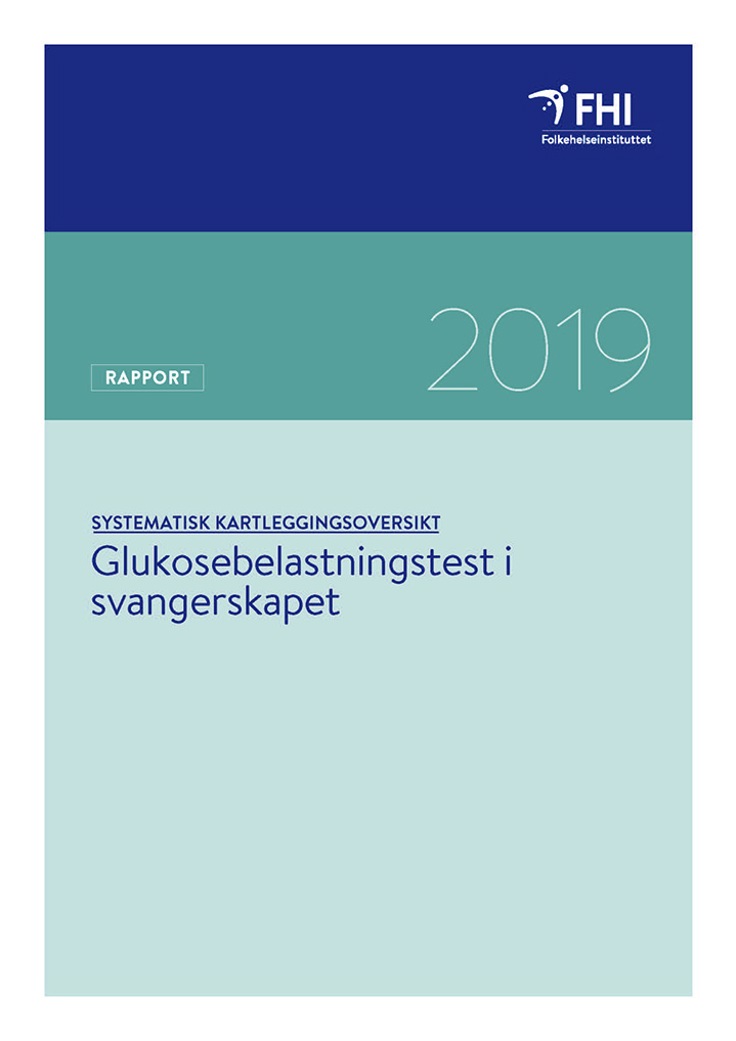Glucose tolerance test in pregnancy: a systematic mapping review
Mapping review
|Published
The Norwegian Directorate of Health has commissioned the Norwegian Institute of Public Health to provide a map of available research about women’s experiences of taking the oral glucose tolerance test (OGTT) in order to identify gestational diabetes.
Key message
The Norwegian Directorate of Health has commissioned the Norwegian Institute of Public Health to provide a map of available research about women’s experiences of taking the oral glucose tolerance test (OGTT) in order to identify gestational diabetes.
We systematically searched seven electronic databases. We searched for studies that include experiences and opinions of pregnant women who had an oral glucose tolerance test conducted in order to identify gestational diabetes.
We included four studies with a total of 412 pregnant women. Women had been asked about their experiences and opinions about taking the test. Three of the studies used a questionnaire and one study used a semi-structured interview. The studies were conducted in Australia, Canada, Germany and Sweden.
We also identified a study with semi structured interviews of 17 gynaecologists about their experiences and opinions about providing the oral glucose tolerance test to pregnant women. This study was conducted in Germany.
Summary
Background
While planning a revision of the Norwegian National Guideline for Gestational Diabetes, the Norwegian Directorate of Health wished to have an overview of published research about women’s experiences with the glucose tolerance test for identifying gestational diabetes. The oral glucose tolerance test involves a blood sample, then the women drink a glass of water containing glucose (sugar). After two hours, a new blood sample is taken. The level of blood sugar is measured in the two blood samples. In what way are women’s feelings, awareness and attitudes about their pregnancy and own health affected by taking the glucose tolerance test?
Objective
Our objective was to conduct a systematic mapping review of published research about women’s experiences with the glucose tolerance test for identifying gestational diabetes.
Method
We prepared this systematic mapping review in accordance with our protocol. We used the following inclusion criteria:
Population: Pregnant women living in high- income countries
Intervention: Oral glucose tolerance test to identify gestational diabetes
Outcome: Experiences and opinions of taking the oral glucose tolerance test, both positive and negative
Study design: Any
Languages: Danish, English, Norwegian, Swedish
Our literature search covered seven electronic databases, and was conducted in May 2019. Two people, independent of each other, read and assessed titles and abstracts towards the inclusion criteria. Publications that both, or one of the assessors thought potentially relevant, were obtained in full text. Full text publications were also assessed towards the inclusion criteria by two people independently of each other. If there had been disagreement, a third person would have been consulted. One person extracted information from the studies, and another person checked the correct information had been collected accurately. This systematic mapping review has not assessed the risk of bias of the included studies. Therefore, we have only presented which outcomes that are reported in the studies, not the actual results.
Results
We included four studies with a total of 412 pregnant women who had been asked about their experiences and opinions about taking the oral glucose tolerance test in order to diagnose gestational diabetes. Three studies used a questionnaire; the fourth study used a semi-structured interview. These studies were conducted in Australia, Canada, Germany and Sweden.
The semi-structured interview with 20 women reported four categories: women’s opinions regarding screening, individual experiences in the screening administration, reasons for carrying out the screening and suggestions for the future.
One of the three studies that used a questionnaire asked 117 questions to 103 women. Five themes were identified: knowledge; information and preparation; consequences for women of centralized care; treatment accessibility; participation, responsibility and respect for opinions.
The other two studies asked one relevant question each, one asked about the convenience of the test, and the other about their experiences with the test.
We also identified a study with interviews of gynaecologists about their experiences and opinions about administering the oral glucose tolerance test to pregnant women. This study was conducted in Germany.
Discussion
We found only four studies about women’s experiences with or opinions of the oral glucose tolerance test for identifying gestational diabetes.


